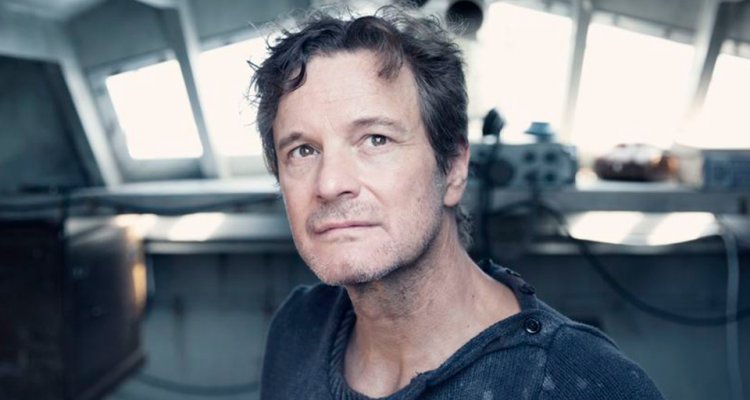When men and women dream, they can literally fly, yet like Icarus’ journey, triumph can just as easily transform into tragedy if exuberance overcomes common sense. Indeed, what brings out the best in people can also lead to the worst when good intentions are met with the harsh realities of science and nature. Director James Marsh takes this up in “The Mercy” with an exploration of real-life sailor Donald Crowhurst (Colin Firth), whose attempt to circumnavigate the globe in 1968 and ’69 shook the sailing community to its core. And while the film is a touch sparse in secondary character development, it more than makes up for this with its bracing honesty and commitment to the real-life events that inspired it.
As “Mercy” opens in 1968 England, Donald Crowhurst looks on with jealous eyes as a crowd of onlookers at a boat show fawn over sailor Francis Chichester (Simon McBurney), who is being celebrated for his recent one-stop circumnavigation of the globe. Chichester relays that a contest has been announced that will award £5000 to the first person to solo sail around the globe, non-stop, which sets something alight inside of Donald. A producer of electrical navigation equipment whose sailing experience hasn’t seen him float more than a handful of miles away from home, Donald is compelled to enter the contest.
Although Donald’s wife, Clare (Rachel Weisz), raises the very reasonable concern that her husband doesn’t have the sailing experience, money, or even the boat needed to make the trip, this doesn’t phase him. No, Donald has fallen prey to adventurer fever, and forges ahead with his plans in spite of all the obstacles. And there are indeed many, including what effectively amounts to pawning his home and business in exchange for the loan that will finance the endeavor. Donald also hires a publicist, Hallworth (David Thewlis), to drum up publicity for the stunt, which will pay off handsomely if he completes the journey (and will make a fool of him if he doesn’t). Open sea sailing is a challenging feat for the best sailors in the sturdiest vessels, and as the second act begins to unfold, the audience realizes that Donald very well might be in trouble.
‘Mercy’ proceeds from here, tracking Donald’s increasingly desperate voyage as one mishap follows another, all while the physical and mental strain of the journey begin to take their toll on the man. Firth does outstanding work in a role that requires him to do most of his acting alone throughout the latter half of the picture, when the starch in his stiff upper lip begins to dissipate. As an actor, he’s made a career out of playing under-achieving characters whose shambling self-deprecating earnestness allows them to fail-upwards. Audiences have come to expect him to lose the battle yet win the war, which makes him the perfect choice for this role, really, as this plays into the natural hope that Donald too will win out against all odds.
Donald is a good man at heart and enters the circumnavigation race for all the best reasons, yet during every step, at each new development, the rug keeps getting pulled out from under him. People are rooting for this guy, just as the audience is, yet as ‘Mercy’ moves into its second half, it becomes clear that the voyage is a far more daunting one than Donald is prepared for. Marsh does excellent work keeping the development of this trouble in the foreground while Clare, Hallworth, and the world look on, hoping (as the audience does) that this good man will find a way to overcome all the obstacles.
It all makes for an engaging viewing experience that relies less on the physical staging of the action and more on the psychological exploration of Donald throughout the voyage. It’s a credit to Firth and Marsh that they’re able to keep the film clipping along thus, as Donald’s descent into desperation and despair take hold of the narrative. In many other films, watching a person go sea-mad would feel like a chore (check out “In the Heart of the Sea” for an example), yet the development feels entirely organic in ‘Mercy.’
Still, there are a few rough patches. Weisz has little to do for the majority of the picture aside from wringing her hands and looking expectantly into the distance of the coastline, and aside from Donald, there’s little in the way of an arc for anyone. On the one hand, this seems reasonable, for this story is Donald’s, and any detours might well have come off as distracting. Yet, knowing more about Clare’s relationship with her husband and what drove her to support would have rounded out her character.
Intriguing, tragic, and 100% relatable, “The Mercy” is a gripping look at man’s struggle to achieve greatness at all costs and has a lot to say about what those consequences entail when the receipts are tallied. A stellar turn by Firth, as well as a tidy 95-minute, keep this film afloat. [B]

